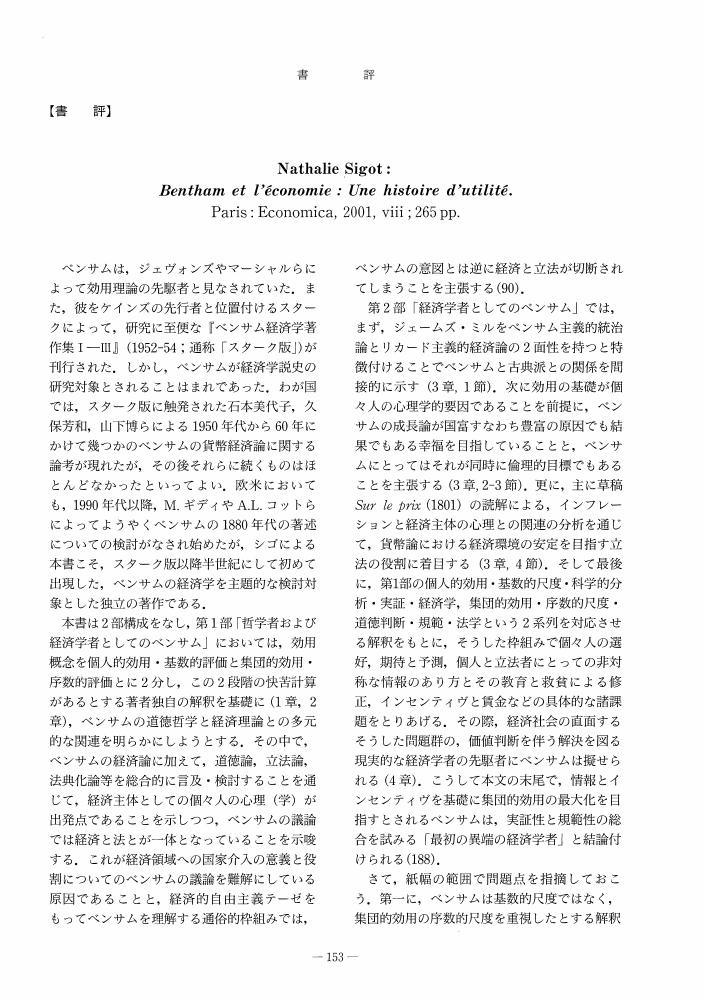5 0 0 0 OA J.S.ミルの宗教論 : 自然・人類教・"希望の宗教"
- 著者
- 有江 大介
- 出版者
- 横浜国立大学
- 雑誌
- 横浜国際社会科学研究 (ISSN:13460242)
- 巻号頁・発行日
- vol.12, no.6, pp.675-708, 2008-02
4 0 0 0 OA 自然神学の「幸福な世界」 : 19世紀前半ブリテンにおける神学的経済社会把握
- 著者
- 有江 大介
- 出版者
- 横浜国立大学
- 雑誌
- エコノミア (ISSN:00129712)
- 巻号頁・発行日
- vol.56, no.1, pp.1-18, 2005-05
4 0 0 0 IR クラーク=ライプニッツ論争(1715-16)の社会科学的含意 : 神論から自然・人間論へ
- 著者
- 有江 大介
- 出版者
- 横浜国立大学
- 雑誌
- エコノミア (ISSN:00129712)
- 巻号頁・発行日
- vol.60, no.1, pp.1-42, 2009-05
2 0 0 0 OA 自然神学の「幸福な世界」 : 19世紀前半ブリテンにおける神学的経済社会把握
- 著者
- 有江 大介
- 雑誌
- エコノミア (ISSN:00129712)
- 巻号頁・発行日
- vol.56, no.1, pp.1-18, 2005-05
- 著者
- 有江 大介
- 出版者
- 経済学史学会
- 雑誌
- 経済学史研究 (ISSN:18803164)
- 巻号頁・発行日
- vol.50, no.1, pp.113-114, 2008-07-31 (Released:2010-08-05)
1 0 0 0 OA 書評
1 0 0 0 OA 書評
- 著者
- 有江 大介
- 出版者
- 経済学史学会
- 雑誌
- 経済学史研究 (ISSN:18803164)
- 巻号頁・発行日
- vol.56, no.1, pp.117-121, 2014 (Released:2019-08-24)
1 0 0 0 OA 塩野谷祐一『経済哲学原理――解釈学的接近』東京大学出版会, 2009年, ix+445頁
- 著者
- 有江 大介
- 出版者
- 経済学史学会
- 雑誌
- 経済学史研究 (ISSN:18803164)
- 巻号頁・発行日
- vol.52, no.2, pp.149-150, 2011 (Released:2019-10-28)
1 0 0 0 OA 塩野谷祐一『経済と倫理-福祉国家の哲学』東京大学出版会, 2002, ix; 444頁
- 著者
- 有江 大介
- 出版者
- 経済学史学会
- 雑誌
- 経済学史学会年報 (ISSN:04534786)
- 巻号頁・発行日
- vol.43, no.43, pp.112-113, 2003 (Released:2010-08-05)
1 0 0 0 OA Nathalie Sigot: Bentham et l'économie: Une histoire d'utilité. Paris: Economica, 2001, viii; 265pp.
- 著者
- 有江 大介
- 出版者
- The Japanese Society for the History of Economic Thought
- 雑誌
- 経済学史学会年報 (ISSN:04534786)
- 巻号頁・発行日
- vol.42, no.42, pp.153-154, 2002 (Released:2010-08-05)
- 著者
- 有江 大介
- 出版者
- The Japanese Society for the History of Economic Thought
- 雑誌
- 経済学史学会年報 (ISSN:04534786)
- 巻号頁・発行日
- vol.37, no.37, pp.183-184, 1999 (Released:2010-08-05)
- 著者
- 有江 大介
- 出版者
- The Japanese Society for the History of Economic Thought
- 雑誌
- 経済学史学会年報 (ISSN:04534786)
- 巻号頁・発行日
- vol.36, no.36, pp.183-185, 1998 (Released:2010-08-05)
- 著者
- 有江 大介
- 出版者
- The Japanese Society for the History of Economic Thought
- 雑誌
- 経済学史学会年報 (ISSN:04534786)
- 巻号頁・発行日
- vol.35, no.35, pp.185-186, 1997 (Released:2010-08-05)
1 0 0 0 OA アダム・スミス: 穏健派とケイムズとシヴィック・ヒューマニズム
- 著者
- 有江 大介
- 出版者
- The Japanese Society for the History of Economic Thought
- 雑誌
- 経済学史学会年報 (ISSN:04534786)
- 巻号頁・発行日
- vol.33, no.33, pp.1-12, 1995 (Released:2010-08-05)
- 参考文献数
- 47
This paper will examine several aspects of the intellectual atmosphere in the middle of eighteenth-century Scotland, where Smith had developed his idea of a new social science.I first introduce mainly through Blair's sermons, that the Moderates' view of providence-based functional society was static and conservative, and lacked the concept of progress or stage theory of society, though they were more enlightened than Presbyterian orthodoxies.Second, I show empirically the psychological expansion of the idea of moral sense by Kames, who introduced feeling as a basic factor for moral judgment. This implies an intellectual tendency that would rather insist human autonomy as a moral agent than claim a priori conscience with an abstract character like benevolence.The intellectual atmosphere above suggests a basic divergence of the Moderates' thought from Smith's framework which was to be shown in Theory of Moral Sentiments or Wealth of Nations. This suggestion would give us an effective device which can rescue Smith from an intricate trap of the so-called civic humanist paradigm that has confined Smith, by applying Q. Skinner's radical relativism, to be just one of eighteenth-century moralists rather than a founder of a new science.
- 著者
- 有江 大介
- 出版者
- The Japanese Society for the History of Economic Thought
- 雑誌
- 経済学史学会年報 (ISSN:04534786)
- 巻号頁・発行日
- vol.32, no.32, pp.138, 1994 (Released:2010-08-05)
- 著者
- 有江 大介
- 出版者
- 経済学史学会
- 雑誌
- 経済学史学会年報 (ISSN:04534786)
- 巻号頁・発行日
- vol.31, no.31, pp.156, 1993 (Released:2010-08-05)
- 著者
- 有江 大介 ARIE Daisuke
- 出版者
- 関西大学経済学会
- 雑誌
- 関西大学経済論集 = Economic review of Kansai University (ISSN:04497554)
- 巻号頁・発行日
- vol.64, no.3, pp.323-340, 2015-03
1 0 0 0 功利主義の歴史的意義と現実的課題の研究
3年間にわたる本研究の最大の目標の1つは、功利(公益)主義の古典原典、それも出来れば未刊の草稿に遡って研究を拡大、深化させ、その成果を国際的に問うことであった。幸い、ベンサム草稿のマイクロ・フィルムを一括購入出来、ロンドン以外でこれを持つのは、日本が最初ということになった。永井、音無、有江、深貝、堀田、桜井、市岡、近藤、立川らは、これによって研究をすすめ、前6名は、その成果を第5回国際功利(公益)主義学会(ニューオーリンズ、1997年3月)で発表した。その後、研究協力を仰いだ坂井、奥野、児玉らがこの線にそって新たに研究を開始している。他方、いま1つの目標は、実践道徳として今日生きている功利(公益)主義が理論的、実践的にいかに機能しているかを確認し、今後さらに人類の福祉と地球環境の保護のために功利(公益)主義をいかに理論的、実践的に展開していくべきかを、考察することであった。この点でも、もちろん、国際交流は必要であって、山内は、オーストラリア国立大のシンガー教授と連携しつつ、生命倫理の問題で研究を深め、樫(研究協力者)もシンガー教授の著書を翻訳して、この面での功利(公益)主義的思考の意義を広めた。理論面では、永井、有江、深貝の3名は、1996年9月、ロンドン大学において、バリー教授の著書(Brain Barry,Justice as impartiality)をめぐっての、日英合同研究会に参加し、それぞれおよそ、1時間半の質疑応答をおこなった。これには、バリー教授自身が参加したのみならず、ローゼン教授、スコフィールド、ケリ-、クリスプ各博士など、約15名がイギリス側から討議に参加し、日本側には他5名が参加した。こうした研究会活動の結果、およそ、国際学会における日本からの発信については、国際的に一定の評価を受け、日英合同研究会の基礎も、一応固まったように思える。若手の研究者も、現れつつあり、今後の一層の理論的、実践的展開が期待される。1998年7月、待望の日本功利(公益)主義学会が旗揚げ出来るようになったのも、3年にわたる本研究補助があり、そのお蔭で研究会を継続できたからである。













